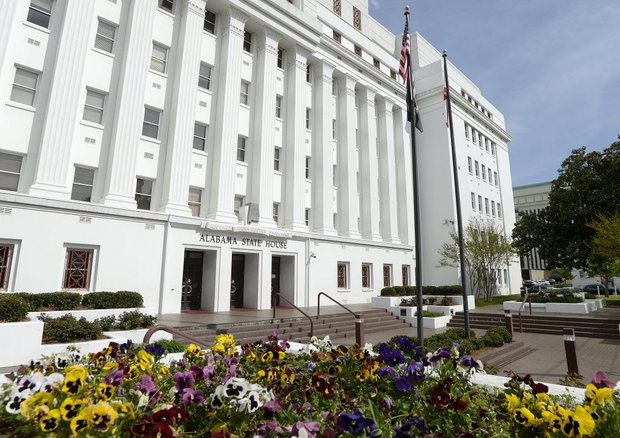Right-to-work amendment passed in Alabama Senate

The Alabama Senate has passed legislation reiterating Alabama’s position as a so-called “right-to-work” state. Senators on Thursday passed the amendment 25 votes to 9. Alabama voters will now have the chance to approve the amendment at the ballot box. Right-to-work states prohibit companies from requiring workers to pay union dues as a condition of employment. Alabama law already has the prohibition, but Republicans said adding the amendment to the state Constitution will give businesses additional assurances. In a debate on the Senate floor, Minority Leader Quinton Ross, a Democrat, called the amendment “asinine” and a waste of time and money. Ross says lawmakers have more important issues they should address. Republished with permission of the Associated Press.
Bill banning speed cameras in police cars passes House committee

The House Committee on Montgomery County Legislation approved a bill Tuesday that would prohibit Montgomery police from using traffic cameras in unoccupied cars, a practice approved by the Alabama Legislature in 2011. SB201, sponsored by Sens. Dick Brewbaker (R-Montgomery) and Quinton Ross (D-Montgomery), comes out of public resentment for the police practice, which essentially establishes decoy cars throughout the city and issues tickets via mail. The 2011 bill specifies that the tickets should be mailed to residents within 30 days of the offense and include a picture of the offending vehicle and license plate, a description of the offense and the time, date and location of the violation. An amendment to the legislation was offered, which would have allowed the cars to be used in residential and school areas but prohibit them on four-lane roads, federal and state highways and in construction zones, but the committee tabled it. In a statement on Facebook, Montgomery Mayor Todd Strange said he was “disappointed” with the committee’s decision, saying that the cameras in residential and school areas are “a tremendous force multiplier that supplement manned enforcement by our traffic officers while allowing other police personnel to fight crime, protect and serve,” explaining “our neighborhoods, our schools and our children” would stand to lose the most. “We will continue to oppose this bill when it reaches the floor of the Alabama House and again ask the members of the Montgomery delegation to seek the opinion of the neighborhood associations and schools regarding the effectiveness of the speed car cameras in unmanned marked police cars,” Strange continued. “Speed cameras work.” The cameras generated just over $136,000 in annual revenue in 2015 — less than 6/10 of 1 percent of the city’s general fund — for a department whose budget is slated to surpass $230 million this year. The legislation, which simply states that the 2011 bill be completely repealed, has already passed the Senate and is now cleared to go before the House of Representatives.
Jim Zeigler may give conservative rebuttal to State of the State address

State Auditor Jim Zeigler announced over the weekend two “taxpaying anti-establishment conservative” groups have asked him to give an unorthodox response to Gov. Robert Bentley‘s State of the State address next week. The annual gubernatorial address to the Legislature, set for next Tuesday, Feb. 2 on Groundhog Day. The State of the State is traditionally followed by a “rebuttal” from leaders of the opposing political party. Senate Democratic Leader Quinton Ross and House Democratic Leader Craig Ford are set to give responses on behalf of the minorities in both chambers. But Zeigler says two right-leaning groups, Alabama Tea Party Conservative Coalition and the Common Sense Campaign, have requested an additional response. Both groups are represented by spokesman Dr. Lou Campomenosi, who said Alabamians deserve to hear from an anti-establishment Republican as well as from the party’s standard bearer, Bentley. Despite coming out aggressively against the federal government on Syrian refugee relocation, health care, and other sundry issues, Bentley has been attacked by many conservatives throughout the state as insufficiently conservative. Campomenosi, a former candidate for Baldwin County School Board among other offices, is among the most outspoken of Bentley’s intra-party critics. Zeigler, for his part, has also been vociferous in his disapproval of the governor. Most recently Zeigler targeted Bentley for allegedly spending a portion of a settlement the state received after the 2011 BP oil spill on renovating an official residence in Gulf Shores for personal reasons. Zeigler said Sunday he will review the requests to give a State of the State counter-rebuttal and decide whether or not to deliver it by Wednesday. Bentley recently told AL.com he will not offer any plans to increase taxes or close loopholes in his speech next week, a subject that has rankled many of his GOP peers despite a substantial budget hole facing state government in Montgomery in recent years. “I have three years left in my administration and I have some major things that I want to get accomplished over the next three years, and I’m going to be pushing those things, and I think the people of Alabama, when they hear them in our State of the State, they’re going to be excited about what we’re trying to do,” said Bentley.
This week in the Alabama legislature: May 19-21

What happened in the Alabama legislature this week? Plenty. On Tuesday, the House passed a general fund budget to the Senate for approval. House Bill 135 assumes no new sources of revenue for the state and just $1.64 billion available to spend from the general fund, an 11 percent decrease from 2014. Gov. Robert Bentley has already vowed to veto the barebones budget, calling it “unworkable” and “irresponsible.” House lawmakers also passed funding bills for the Children First Trust Fund (House Bill 129) and the Coalition Against Domestic Violence (House Bill 134). Thursday was another a big day at the statehouse, as the House passed the $6 billion education budget on Thursday. Rep. Bill Poole, chair of the education committee said the goal of Senate Bill 179 was to shore up funding to classrooms. The budget includes a $13 million increase for textbooks and more than $10 million for the Alabama’s nationally-acclaimed Pre-K program. The Senate passed a bill that would make it legal to keep a loaded gun in an automobile without a concealed carry permit. Senate Bill 14 also says that simply carrying a firearm should not be considered “disorderly conduct.” Alabama’s two partisan presidential primaries will now be held on March 1, 2016 as part of an “SEC Primary” that includes Tennessee and Georgia. Senate Bill 240, sponsored by Sen. Quinton Ross, passed the Senate on Thursday. Ross had previously called the measure an “an economic stimulus bill” because of the expected increased attention Alabama will receive during the 2016 cycle. Finally, Gov. Bentley signed a comprehensive set of prison reforms into law. He called the legislation an “overhaul” more than a year in the making. Sen. Cam Ward brushed away concerns that the reform bill, estimated to cost around $26 million, would be crippled by the budget cuts in the House general fund budget. Here are a few more of the week’s highlights: Sen. Jabo Waggoner’s Alabama Dog Tethering and Outdoor Shelter Act passed out of the Senate Judiciary. Animal activists say that cruelty protections rarely get attention from legislators and, with the 2015 legislative session drawing to a close, Senate Bill 468 might be their last chance to pass legislation against animal cruelty this year. Sen. Del Marsh brought a bill to offer employment protections for the LGBT community before the Senate governmental affairs committee. Senate Bill 482 would ban state officials from discriminating against employees based on sexuality and gender expression, in addition to of race, ethnicity, or religion. The bill was carried over after lawmakers expressed concerns that stakeholders had no chance to offer input on the proposal. A public hearing has not yet been scheduled. The House financial services committee declined to vote on a 36 percent cap and tighter regulations of subprime loans that use cars and other assets as collateral. House Bill 400 would have required title lending companies to be licensed by the state and adhere to state-level restrictions on the charges, interest, and fees associated with title loans. The House Education Policy Committee voted to remove the Alabama State Board of Education from the process of choosing a charter school commission. Rep. Terri Collins said that she filed House Bill 664 because of concerns that the BOE would not have a new commission in place by the June 1 deadline.
House passes bill to move presidential primaries up to Super Tuesday

The Alabama state House on Thursday passed SB 240, a bill sponsored by Sen. Quinton Ross that moves the state’s two partisan presidential primaries from the summer of 2016 to Super Tuesday on March 1, when Alabama’s delegates will be more actively sought after by presidential candidates. Ross, a Democrat, had previously called the measure an “an economic stimulus bill” because of the expected increased attention Alabama will receive during the 2016 cycle. The state is not generally thought of as a great prize by Republican contenders, because the eventual nominee rarely takes the state in a GOP primary and its seven electoral votes have been all but guaranteed to go in the “R” column for decades. The move is in keeping with a plan, announced last year, to attempt to bring Alabama into the fold as part of a presidential “SEC Primary.” The plan involves fellow Southern states Tennessee and Georgia moving their primary election dates up to the beginning of March as well, which both states have done. Mississippi is also considering a move in the same direction. The bill passed with approval from both the Alabama Republican Party and the Alabama Democratic Party respectively, who are in agreement that being more relevant in contemporary presidential politics is a boon for the state overall. Legislative leaders in Arkansas are also currently trying to move up their primary date during an upcoming special session. Arkansas State Sen. Gary Stubblefield said Wednesday that Gov.Asa Hutchinson has assured him that a March 1 primary bill similar to Ross’ bill that passed the full Legislature Thursday will be on the menu during a Special Session convening Tuesday.
#MayDay: 3 bills lawmakers think will boost state’s economic development
Alabama lawmakers will spend this weekend working through Sen. Del Marsh’s gaming legislation for the state economy. In honor of May Day (or International Workers’ Day), here are three other bills moving through the Legislature that could add to the conversation about workforce prospects in Alabama: Sen. Lee Pittman’s legislation to establish a separate board of trustees for Alabama’s two-year colleges is back in the Senate. The bill states that the board would focus on developing highly specialized training programs to prepare entry-level employees to meet growing workforce demands. Under current law, the state board of education is responsible for community colleges, junior colleges, technical colleges, and trade schools. The House Ways and Means Education Committee is considering the Alabama Renewal Act. Sponsored by Rep. Chris Pringle, the legislation would create several new tax credits and small business credits to fuel economic growth. The bill also states that if a company receives Jobs Act incentives and employs veterans for at least 22 percent of its workforce, it can receive an additional tax credit of 0.5 percent of the wages paid to veterans. A proposal from Sen. Quinton Ross would make it illegal for an employer to disqualify an applicant based on their criminal history if their record isn’t directly related to the job. Employers would be barred from even considering a potential employee’s criminal background until a conditional job offer is extended. Ross has argued that the bill would reduce barriers to employment for people with arrest and conviction records, reduce recidivism, and improve economic stability. The Senate panel on fiscal responsibility has not yet voted on the measure.
Fight over legislative districts returns to district court
The fight over Alabama’s legislative districts is shifting back to Montgomery after a divided U.S. Supreme Court said a lower court must take another look at whether GOP lawmakers relied too heavily on race when they drew new district lines. James U. Blacksher, a lawyer for the Alabama Legislative Black Caucus, which filed the lawsuit against the plan, said they will fight to have the legislative districts redrawn after the case officially gets back to federal court next week. The caucus this past week presented a map of proposed new lines, which Blacksher said should be a starting point for negotiations. “Ultimately we are going to have to have another election,” Democratic Sen. Rodger Smitherman of Birmingham said. “It’s going to be difficult, if not impossible, to do what the court said without having new elections.” The Alabama Democratic Conference and the Alabama Legislative Black Caucus had challenged the lines that were the drawn in 2012 under the newly elected GOP legislative majority. The U.S. Supreme Court last month reversed a lower court ruling that upheld the plan, saying the court did not properly consider complaints that state officials illegally packed black voters into too few voting districts. Justices said the lower court should have looked at claims of racial gerrymandering on a district-by-district level, not just statewide. The Supreme Court majority also said Alabama took a position of prioritizing racial targets when drawing districts. Instead of asking how it could maintain the minority percentages in districts, justices said, the court should have asked what percentages the minority should have to elect their candidate of choice. “The issue now will be whether the plaintiffs proved any of these districts were drawn predominantly on race,” Alabama Solicitor General Andrew Brasher, who handles appellate litigation for the state. Brasher predicted that the map would ultimately be upheld. “The district court said there are a lot of other reasons to draw the lines that way.” Republicans said their plans complied with the voting rights law by preserving all the districts in which blacks were a majority and adjusting populations so that districts contained about the same number of people. The new plan allowed only a 2 percent population difference between districts, a much lower variance than previous plans. Black lawmakers said the new lines resulted in the “stacking and packing” of black voters into designated minority districts, limiting minority voters’ ability to influence elections elsewhere. Justices put a spotlight on Senate District 26, a district that includes most of the majority-black neighborhoods in Montgomery. “Of the 15,785 individuals that the new redistricting laws added to the population of District 26, just 36 were white — a remarkable feat given the local demographics,” justices wrote. The Supreme Court majority, in its opinion, said, “There is strong, perhaps overwhelming, evidence that race did predominate as a factor when the legislature drew the boundaries of Senate District 26.” “It was so obvious and so blatant what happened,” said Quinton Ross, the senator from Senate District 26. Plaintiffs said the doubt raised by justices over that specific district is a strong indicator that they will prevail on remand. “There will be a big ripple effect,” Blacksher said. “The problems they identified in Senate District 26 are identical to those in the other districts.” GOP legislative leaders said they think their map will ultimately be upheld. “I’m confident at the end of the day, district lines are going to stay like they are,” said Speaker of the House Mike Hubbard, an Auburn Republican. Republished with permission of The Associated Press.


